

The world of marketing is highly dynamic. Anything —from a competitor launching a new product to an update in the search engine algorithm—could morph the face of marketing as we know it. And let’s not even get started about the AI revolution.
Against such disruptions, keeping up with the various changes, pivoting marketing strategies, and honing marketing skills are challenging prospects. However, it is achievable with the right marketing mentor.
A marketing mentor is a seasoned navigator who helps you navigate the labyrinth your early marketing career can feel like. Equipped with the right skill sets and a depth of knowledge and experience, they help you overcome adversity and grow professionally.
However, finding the right mentor is a journey in itself. For this reason, this guide will help you find a marketing mentor!
- Who is a Marketing Mentor? What Do They Do?
- 5 Types of Marketing Mentors
- 12 Qualities of a Good Mentor for Marketing
- 1. Industry expertise
- 2. Specific certifications
- 3. Effective communication
- 4. Active listening
- 5. Honesty and integrity
- 6. Empathy and understanding
- 7. Similar values
- 8. Passion for teaching
- 9. Commitment to personal growth
- 10. Accessibility and availability
- 11. Positive attitude
- 12. Respect for diversity and inclusion
- Career Benefits of Having a Marketing Mentor
- 9 Places to Find a Marketing Mentor and Connect With Them
- How to Find a Mentor in Marketing?
- Step 1: Know what you seek in a mentor
- Step 2: Identify three to five potential mentors
- Step 3: Connect and introduce
- Step 4: Request for a meeting
- Step 5: Show appreciation and follow up
- Step 6: Cultivate the relationship
- Step 7: Offer help or assistance
- Step 8: Formally request them to be a mentor
- Step 9: Nurture mentor-mentee relationship
- How to Make the Most of Your Marketing Mentor-Mentee Relationship?
- Ready to Take Over the Marketing World?
Who is a Marketing Mentor? What Do They Do?
A marketing mentor is a seasoned professional in the field of marketing. They volunteer their time and expertise to help individuals achieve their professional and marketing goals. In some cases, marketing mentors may also guide organizations or support business leaders to achieve long and short-term objectives.
Typically, marketing mentors are experienced and successful marketers passionate about giving back to the community. They offer insights, advice, and feedback based on their experiences to empower the next generation of marketers and help them achieve the same level of success—if not more.
Mentors act as advisors, confidants, and role models to their mentees. They cultivate a supportive and nurturing relationship that helps mentees set career goals, prepare actionable roadmaps, and acquire skills and competencies to reach the pinnacle of the marketing industry.
Additionally, they tap into their professional network to unlock opportunities, valuable connections, and exposure for mentees.
5 Types of Marketing Mentors
Now that you understand who a marketing mentor is, let’s explore their various types. The following are five common types of marketing mentors:
1. Marketing strategy mentors
Marketing strategy mentors are experienced professionals who specialize in offering advice and guidance around marketing strategies. They understand market dynamics, consumer behavior, competitors, and other variables that govern marketing decisions.
They provide valuable insights, ideas, and problem-solving techniques to help mentees develop long-term marketing roadmaps. They enable mentees to develop tailored marketing strategies aligning with the organization’s goals, objectives, and requirements. The mentor also helps mentees deploy data analytics and identify the right metrics to measure the success of a marketing strategy.
The combination of first-hand knowledge and creative marketing strategies optimizes resource allocation, capitalizes on opportunities, and improves the chances of success.
2. Growth marketing mentors
Growth mentors are veterans who leverage their experience to steer companies toward rapid yet sustainable business growth. The roots of this value proposition go back to their days as growth marketers.
Having spent time in the field, these mentors have in-depth insights into innovative growth hacks and experimental marketing strategies. They’ve had their share of skyrocketing startups and small businesses. They’ve leveraged data-backed insights and instinct to develop formulae that can propel businesses to new heights. Over the years, they’ve finetuned their growth marketing strategies to make them more performance-focused, scalable, and responsive to market conditions.
As mentors, they then pass down all these years of knowledge and experience to their mentees. Mentees can learn actionable skills surrounding customer acquisition, retention, loyalty, branding, and revenue generation to enjoy instantaneous and long-term success.
3. Digital marketing mentors
Digital marketing mentors are experts at navigating the ever-evolving world of digital marketing. Their expertise spans organic growth through search engine optimization (SEO) to paid growth using pay-per-click advertising (PPC). They help mentees stay abreast with the latest digital marketing trends, tools, and technologies while enabling them to solve challenges in digital marketing.
They also empower mentees to harness data-driven insights and strategies to establish a robust online presence, enhance brand visibility, and drive meaningful engagement with the target audience.
By working together, the mentor and mentee can develop detailed digital marketing campaigns to deliver SMART results that align with business objectives.
4. Content marketing mentors
The increase in content marketing mentors coincides with the rise of content marketing. These experts specialize in crafting strategic and compelling content that resonates with the target audience to drive desired results like attracting website traffic or increasing sales.
From nurturing leads through educational content to retaining customer interest with how-to guides and hacks, they make the product or service attractive and value-loaded throughout the customer lifecycle. They possess a deep knowledge of storytelling, content marketing principles, and the audience’s content preferences to facilitate this.
You could seek help from a content marketing mentor to learn more about:
- Developing creative briefs
- Preparing content assets
- Segmenting audiences
- Preparing brand content guidelines
- Amplifying messaging and outreach
- Driving engagement across various marketing channels

5. Social media marketing mentors
Social media marketing mentors form a specialized subset of digital marketing mentors. They are experts at leveraging social media platforms to build brand presence, drive engagement, and connect with audiences. Most importantly, they possess the expertise to stay ahead of changing social media trends and foster a sense of community using social media platforms.
Their ability to prepare comprehensive social media marketing strategies, build content calendars with appropriate cadence, create, publish, and promote engaging content, and manage communities makes them highly sought-after in social selling.
They help mentees discover innovative ways to harness social media platforms’ power while teaching them the skills to analyze, track, and benchmark the performance of social media marketing campaigns.
12 Qualities of a Good Mentor for Marketing
You now understand what a marketing mentor is, what they do, and their various types. It’s time to explore the qualities you should seek in a potential mentor.
Here’s a list of some qualities of good mentors:
1. Industry expertise
The marketing mentor must possess profound industry expertise cultivated through years of working in the marketing domain. As mentioned, they should be established marketers themselves with a track record of working on popular campaigns. Such a feat illustrates that they have an in-depth understanding of the various practical and theoretical aspects of marketing, such as marketing trends, strategic approaches, consumer behavior, etc., so they can expertly guide you.
2. Specific certifications
Marketing mentors often hold marketing certifications like Google Ads Certification, Content Marketing Certification, Microsoft Advertising Certification, etc. These validate their knowledge and proficiency in specific fields and testify to their commitment to continuous learning and professional development. Such indicators should grant you confidence while cultivating a mentor relationship.
3. Effective communication
Communication is the cornerstone of a successful mentoring relationship. After all, the mentor will provide guidance, insights, and feedback to improve your marketing skills, which can only be conveyed through effective communication. By maintaining clarity and precision in their communication styles, mentors will find it easier to transmit key concepts or strategies to help them grow and learn.
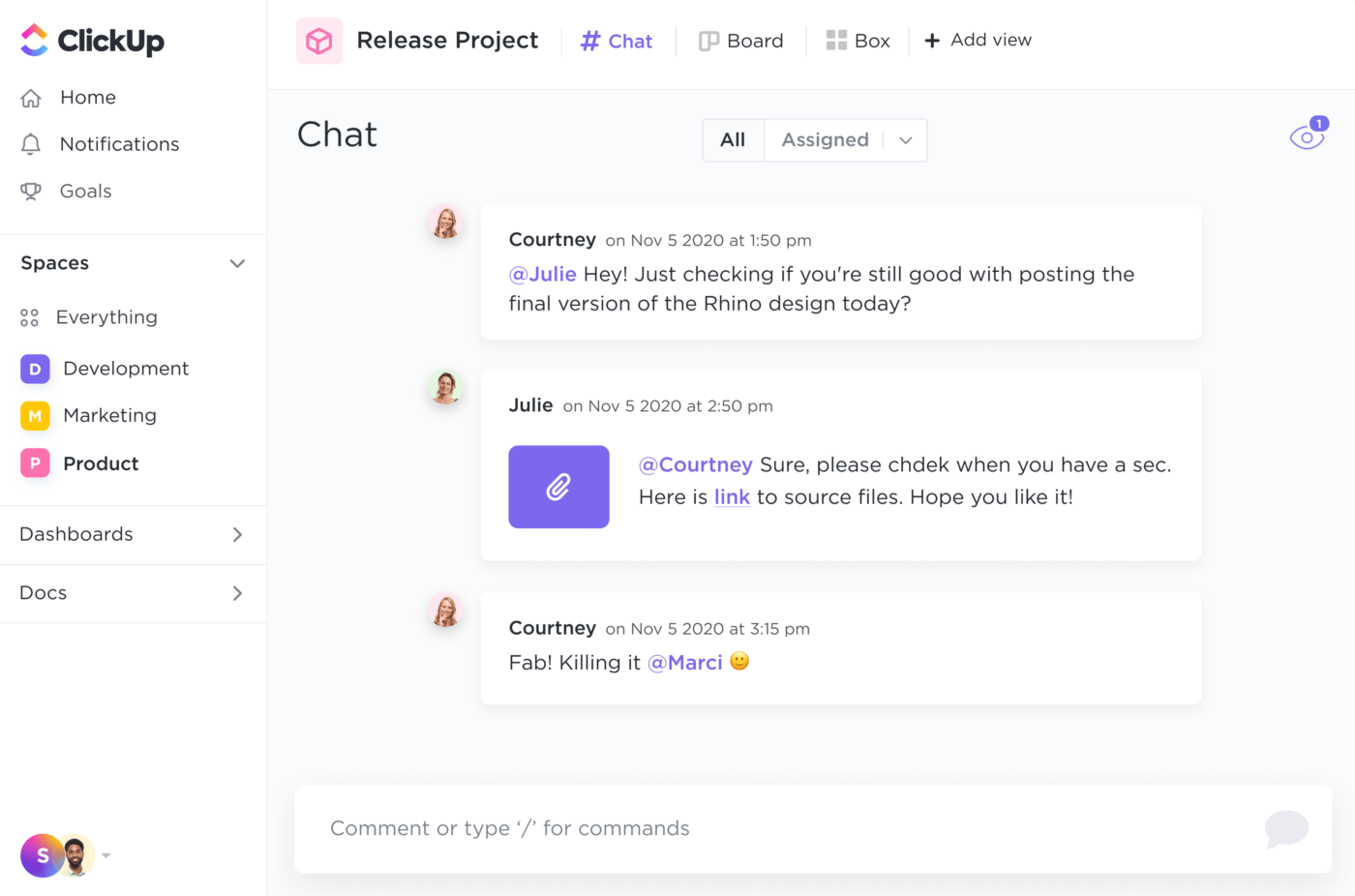
4. Active listening
While you must put in your fair share of active listening, the marketing mentor must also practice active listening to tune into your concerns, questions, suggestions, and perspectives. By staying receptive to your input, they can enhance the mentor-mentee relationship, cultivate a supportive environment, and facilitate open and constructive dialog.
5. Honesty and integrity
Honesty and integrity are absolute and non-negotiable qualities in a prospective mentor. After all, they influence actions and decisions that shape your career as a digital marketer yourself. Mentors should uphold the highest standards of ethics and transparency to help you reach your full potential.
6. Empathy and understanding
Empathy and understanding will help your mentor connect with you better. Their ability to empathize with your specific challenges and experiences will build trust and rapport while strengthening the mentor-mentee relationship. The resulting safe space will make it easier for you to turn to them for help, guidance, and support.
7. Similar values
You want to work with like-minded people, so you should seek a mentor who shares your work ethic and values. Such value alignment forges strong bonds based on mutual respect, making it easier for you to understand each others’ perspectives and grow together.
8. Passion for teaching
Marketing leaders are often quite busy. On the other hand, mentorship requires them to invest time and energy into the mentees’ growth and development. You want a mentor driven by a passion for teaching and sharing their experiences, so they carve out the time for you.
9. Commitment to personal growth
Despite being well-established in their careers, marketing mentors should have a hunger for personal growth and development. By embracing the principles of self-improvement and continuous learning, they act as role models, inspiring you to embrace a growth mindset and pursue excellence.
10. Accessibility and availability
You may need a marketing mentor available at specific times of the day within a particular time zone. Similarly, you may want to reach out to them over particular channels. So, accessibility and availability are essential to consider while selecting your mentor.
11. Positive attitude
A positive attitude is infectious and conducive to learning. Looking for a marketing mentor who can uplift your spirits even in trying times and reinforce your self-confidence would be best. Such optimism and enthusiasm will encourage you to overcome challenges and pursue your career goals with absolute determination.
12. Respect for diversity and inclusion
A good marketing mentor understands the role of Diversity, Equity, and Inclusion (DEI) principles. This opens them up to successful mentoring relationships with individuals from diverse backgrounds and helping them thrive and succeed, regardless of their race, gender, ethnicity, sexuality, or background
Do keep these qualities in mind, as they will come in handy when we explore the step-by-step guide on finding a digital marketing mentor in the later sections.
Career Benefits of Having a Marketing Mentor
Having a marketing mentor rooting for you promises the following benefits:
Experience-based knowledge
Having a great mentor helps you tap into their rich experiences and knowledge. They draw from their experiences working in different sectors and for various clients and use such insights to guide mentees.
So, whether selecting the right marketing tools for small businesses or developing omnichannel marketing strategies for enterprises, mentors can walk you through real-world scenarios, possible challenges, and opportunities. They are an indispensable asset, empowering you with the practical know-how for navigating the marketing world.
Fresh perspectives
You may hit a creative dead-end after years of working as a marketer in the same sector or organization.
A marketing mentor with a background different from yours can invigorate your skills with fresh perspectives that help you visualize challenges and opportunities in a whole new light. Whether it is their diverse backgrounds or experiences, they inject alternative viewpoints and innovative ideas that you may otherwise miss out on. Think of them as a fresh pair of eyes to gain objective opinion.
Invaluable guidance
Combining experience-based knowledge and fresh perspectives allows mentors to steer business decisions expertly. As such, they are a trusted adviser in preparing well-structured, strategic, and comprehensive marketing plans that align with your business goals and target audiences.
They may also help you develop detailed marketing plan templates that streamline existing processes and help you tap into new opportunities. Such templates and frameworks can be an excellent starting point as you no longer have to start building strategies or campaigns from scratch. This jumping-off point helps you drive tangible results faster and more effectively.
Refined professional skills
Mentorship can refine your professional skills and act as your guiding star. The mentor may offer you feedback on your existing marketing strategies and techniques. Further, they may help you identify and master essential skills such as market research, campaign execution, strategic planning, performance analysis, etc.
Finally, they may tender career advice and recommend specialized marketing courses or certifications to help you meet your professional goals.
Increased confidence and accountability
Mentors offer ongoing support and encouragement, which can significantly boost your confidence in your marketing skills and capabilities. At the same time, achieving results at an accelerated rate further consolidates this confidence.
The resulting positive feedback loop, paired with the mentor’s constant reassurance and validation, can be your emotional anchor. Whether facing unprecedented challenges or struggling with self-doubt, having a mentor strengthens resilience and perseverance.
The renewed confidence encourages you to make bold decisions, take on new challenges, maintain accountability, and pursue ambitious business goals with great conviction.
Richer and wider professional network
A marketing mentor can help you build a richer and wider professional network. Mentors often have extensive connections within the marketing industry, which can grant you much-needed exposure.
These networking opportunities can range from introductions to industry professionals, fixing new and exciting collaborations, and recommending you to new clients! Your mentor opens doors to new career or networking opportunities and collaborations.
Source of inspiration
Mentors are a source of inspiration. The fact that you’ve chosen someone as your mentor illustrates their expertise and success in their respective field. Working with them is a matter of honor and pride, pushing you to aim higher, pursue your passion, and strive for excellence in your marketing career. Getting validation, encouragement, and guidance in such pursuits will motivate you to work harder.
Saves time and effort
Leveraging the mentor’s skill, knowledge, expertise, and guidance allows you to accelerate your own learning while avoiding costly errors and experiments.
On the contrary, you get access to proven shortcuts, best practices, and strategies that help you achieve your marketing goals without waste.
Career advancements
Given the above benefits, mentorship can help you reach your professional goals faster and more efficiently. Mentors will offer you valuable career advice, unlock opportunities for personal and professional growth, grant you exposure to the marketing sector, share insights on emerging trends, recommend capacity-building programs, and refer you for job openings and promotions. In short, they fast-track your career path in marketing.
9 Places to Find a Marketing Mentor and Connect With Them
The mentor-mentee relationship is unique; to work, it must be the perfect match of skills, attitudes, and expectations. Finding the right mentor can often be a challenge, but there are some places you can start with.
1. Mentors within organizations
Most companies have an internal mentorship program that pairs an experienced marketer with a junior employee. To participate, you simply need to speak to your HR department or supervisor and express an interest in the program.
Once you sign up, attend orientation or any other event. This will allow you to learn more about the potential mentor you wish to work with.
2. Online mentorship platforms

You can find a mentor on online platforms like GrowthMentor, MentorCruise, and more. These online platforms connect mentors with mentees across various industries, including marketing. Register on these platforms and create a detailed profile.
Highlight your background, interests, achievements, and goals. Then, use the built-in filters to search through an extensive list of mentors.
3. Professional associations
Professional associations like the Chartered Insitute of Marketing (CIM) and the American Marketing Association (AMA) regularly run mentorship programs and host networking events.
Although it may come at a cost, joining such professional networks helps you connect with potential mentors. Become active members of such organizations to stay in the loop and grow your professional network.
4. Marketing networks
Online and offline marketing networks can help you connect with experienced marketers who may be willing to mentor you. Search for local marketing networking groups in your area or join online communities and groups dedicated to marketing.
Actively participate in group discussions, share your ideas and insights, and build a professional relationship with others. The more you engage, the more likely you find a mentor.
5. Industry events or meetups
Attending industry events, workshops, seminars/webinars, panel discussions, conferences, and meetups is a great way to meet potential mentors. Such marketing events offer exposure and help you connect with experienced professionals.
Even if you do not find a mentor through this channel, your networking experience with fellow marketers and attendees can bring you one step closer.
6. Forums and online communities

Forums and online marketing communities are hotspots for marketing mentors. Hop over to Reddit’s r/marketing subreddit or dedicated Facebook groups to connect with experienced marketers willing to offer mentorship.
Contribute regularly, engage in discussions, ask questions, seek advice, and offer assistance to get noticed in these communities. Your active involvement will also help you build professional relationships.
7. Cold outreach on social media
Social media platforms like LinkedIn, Instagram, and X (formerly Twitter) can be an effective tool to connect with potential mentors. Once you’ve done your research and shortlisted a few experienced marketers you wish to work with, give them a follow on various social media websites.
Engage with their content by leaving likes and comments and sharing them on your social media handle. Once you’ve built some rapport, you can direct message the digital marketing mentor with a pitch expressing your admiration for their work and interest in learning from them. Do keep things respectful, and avoid spamming them.
8. Sign up for a marketing course
Enrolling in courses to learn digital marketing, whether online or in-person, can offer opportunities to connect with experienced instructors. Sometimes, these courses may also connect you to guest speakers and panel experts who may be interested in mentoring you. Participate actively in class to capture the interest of a potential mentor.
9. Volunteer work or internship
Interning at digital marketing agencies or volunteering for marketing projects can expose you to seasoned marketing professionals who may be willing to mentor you. You can also offer your assistance to marketing campaigns, business events, and initiatives that offer hands-on experience in the sector.
How to Find a Mentor in Marketing?
Now that you know where to find a mentor, it’s time to go ahead with the how of it. Here is a detailed step-by-step guide on how to find a marketing mentor:
Step 1: Know what you seek in a mentor
Start by explicitly identifying your marketing goals, aspirations, strengths, and skill gaps. Ask yourself, ‘What specific areas of marketing do I need to excel in?’ Introspecting and deliberating on such questions will clarify areas where you need guidance and what to expect from a marketing mentor.
Next, list the skills, knowledge, experience, and qualities you seek in a perfect mentor. We’ve laid much groundwork for you; you only need to tweak it based on your learning preferences and align them with your requirements.
Commencing your search after performing this assessment will help you locate the appropriate marketing mentor.
Step 2: Identify three to five potential mentors
We’ve already shared an exhaustive list of digital and physical hotspots where you might find potential mentors. Go through your professional networks, social media, online and offline events, marketing communities, referrals from colleagues, etc., to identify those who broadly fit your description of a mentor.
We recommend shortlisting a minimum of 3-5 potential mentors. Research their backgrounds, skills, experiences, etc., and compare them to your ideal marketing mentor profile.
Also, look up their customer testimonials, connect with previous mentees, and check reviews on mentorship platforms to get an idea of the mentor-mentee relationship.
Step 3: Connect and introduce
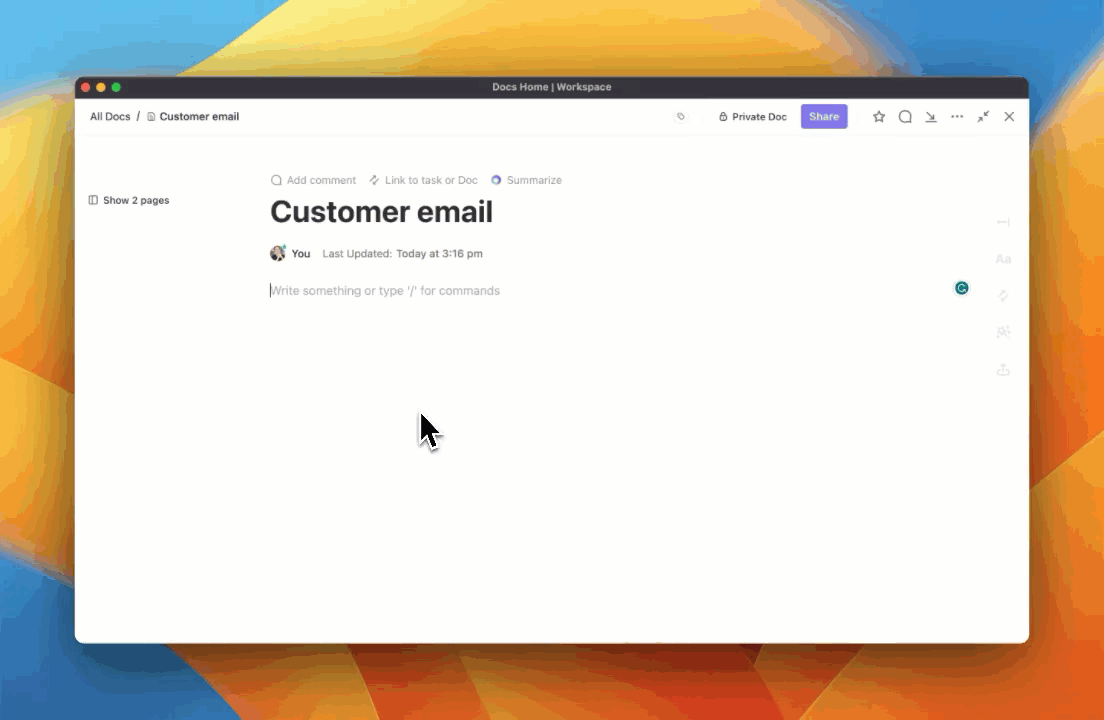
Once you’re satisfied with your picks, reach out to potential mentors through email, professional networking platforms, or mutual connections.
The initial conversation must contain a personalized introduction that outlines your background, interest, and experience as a marketer. Elaborate on the reasons for seeking mentorship, specifically highlighting how what the mentor has to offer aligns with your requirements.
Express genuine admiration for their work and even cite examples of some of their campaigns or successful mentees that inspire you. Keep this message succinct, sincere, and professional. Above all, be authentic.
Additionally, be respectful of their time and availability. If the desired mentor is unavailable due to other engagements or is simply not interested in being a mentor, respect that and move on to the next mentor on your list.
Pro tip: Take help from ClickUp Brain’s AI Writer to craft variations of messages for your outreach to potential mentors
Step 4: Request for a meeting
After initial contact and upon receiving a positive response from a potential mentor, request a meeting or an informal interview to discuss the mentorship opportunity. Set an agenda for the meeting and prepare a list of thoughtful questions or topics to navigate the conversation.
Propose a convenient schedule and format for the meeting, whether in person, on call, or through videoconferencing. Show up on time for the meeting to demonstrate your seriousness about pursuing the mentorship and to display respect for your mentor’s time.
Step 5: Show appreciation and follow up
When the meeting ends, thank the mentor for their time and insights. Send a polite thank you message or an email reiterating your interest in continuing the conversation and further exploring the prospect of mentorship.
Follow up on any commitments or action items discussed during the meeting.
Alternatively, you can share a list of follow-up questions on the topics covered or the ideas exchanged. Such proactive engagement demonstrates your commitment to building a meaningful relationship.
If you’re feeling generous and have that kind of rapport, you can even send a small gift hamper or a thoughtful token of appreciation for the potential mentor. However, ensure it doesn’t come across as excessive or too personal.
Step 6: Cultivate the relationship
Now that the mentor has warmed up to you, nurture a professional relationship by maintaining regular communication. Seek opportunities for active and ongoing engagement in various ways. To do this, you may:
- Schedule regular check-ins to keep them updated on your progress, achievements, and challenges while soliciting their advice or feedback
- Leave a comment sharing your thoughts or expressing appreciation for their latest blog, article, keynote speech, etc.
- Share articles or other resources closely linked to the mentor’s interests or the discussion you’ve had during the meeting
- Invite them to panel discussions, workshops, and digital marketing webinars where they can share their insights
- Attend industry or networking events together
Such interactions will keep you at the forefront of your mentor’s mind and establish a cordial, fulfilling, and positive professional relationship.
Step 7: Offer help or assistance
Show your willingness to contribute to the relationship by offering support or assistance to your mentor as and when required. Volunteer to help with marketing projects, share resources, write recommendations or testimonials, introduce yourself to your network, etc.
Such initiatives demonstrate your value and strengthen your bond with the mentor. The mutually beneficial and collaborative partnership will also entice the mentor to associate with you.
Step 8: Formally request them to be a mentor
Now that you’ve worked to build rapport and forge a meaningful relationship, it is time to formally request the mentor to take on the mentorship role. Communicate your appreciation for their guidance and express their impact on your career growth.
Then, outline your desire to cement the formal mentor-mentee role for a thriving professional relationship. Be clear and specific about your expectations and commitment to this journey so that you and the mentor are on the same page.
Step 9: Nurture mentor-mentee relationship
Once the mentor takes you under their wing, continue nurturing and investing in the mentor-mentee relationship. Schedule regular meetings or check-ins to discuss projects, progress, challenges, and goals along your career path.
You may even discuss prevailing marketing trends, emerging opportunities, and foreseeable obstacles. Seek feedback from the mentor on how you can hone your marketing skills and the areas of improvement. Listen to their guidance and incorporate the mentor’s advice into your professional development plan.
How to Make the Most of Your Marketing Mentor-Mentee Relationship?
Congratulations on finding a mentor to further your marketing career. Here are some tips and tricks to make the most of your successful mentoring relationships:
Establish clear expectations
From the outset, establish clear goals, akin to developing a career map. It should contain what you aim to achieve through mentorship using SMART parameters. Share these SMART goals with your mentor so they understand your primary requirements and expectations.
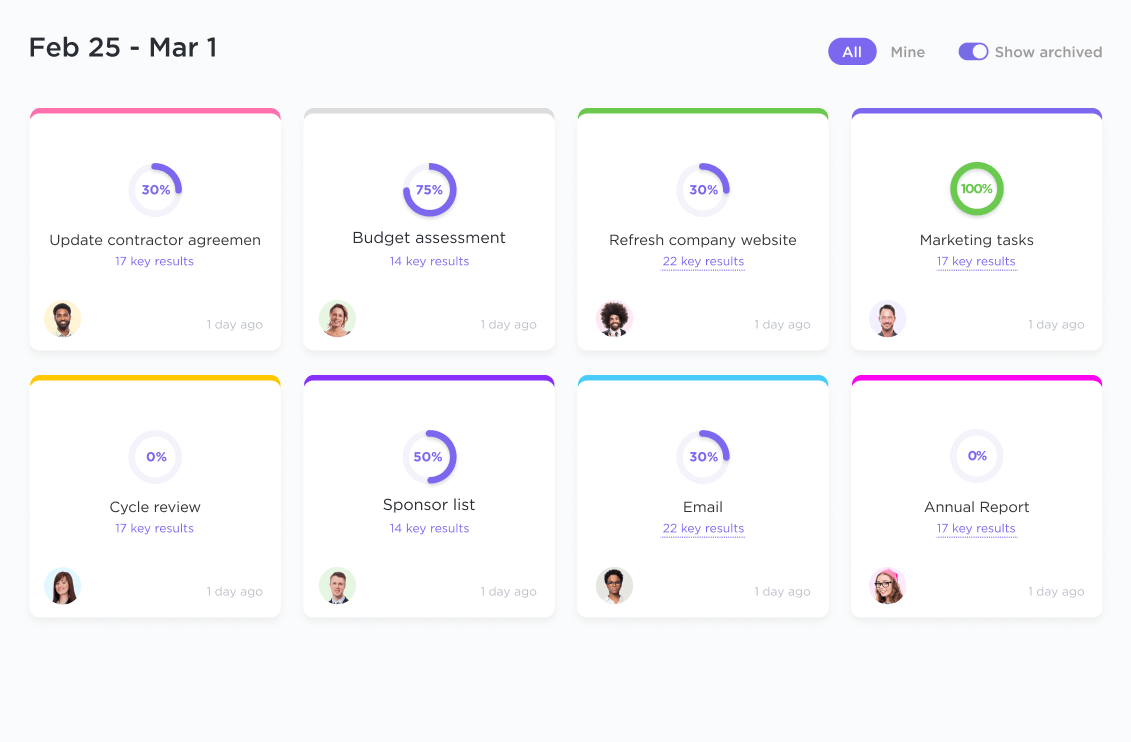
Tools like ClickUp for marketing teams are instrumental in setting clear goals and tracking progress. Use it to create projects or tasks with specific objectives, deadlines, and milestones to define your mentorship journey.
Set periodic and regular follow-up times
Consistency is the key to maximizing the value proposition of your mentor-mentee relationship. Establish a routine to check in with your mentor, address queries, brainstorm solutions to challenges, and discuss progress.

Pro tip: Use ClickUp to schedule regular check-ins. Integrate it with your calendar to receive timely alerts and notifications of any upcoming meetings.
Plan for your mentoring session
Take the time to plan and prepare thoroughly before each mentorship session. This includes reviewing the minutes or key takeaways from the last meeting, jotting down any questions or concerns, and identifying specific topics for discussion. Collect all the necessary materials, resources, and examples that you’ll need to share with your mentor.

Pro Tip: ClickUp Docs is a great way to plan for every mentoring session. Use it to collate all information, ranging from the agenda to resources. Pair it with AI-powered ClickUp Brain to summarize the meeting notes from the previous meeting and automatically generate action items from the latest one.
Maintain communication
Even when you don’t have a meeting scheduled, maintaining regular communication channels with the mentor keeps you on track with your goals. Plus, it makes help, support, and guidance readily accessible.

The Chat View on ClickUp allows you to centralize conversations on a singular platform. You can share resources like project links, videos, spreadsheets, webpages, etc., on chat and use @mentions or assign comments to draw attention to specific items. All chats are organized in logical threads, allowing you to manage communication effectively.
Track progress
Tracking progress lends clarity and direction to your professional development. Fortunately, ClickUp is a powerhouse when it comes to tracking measurable progress.
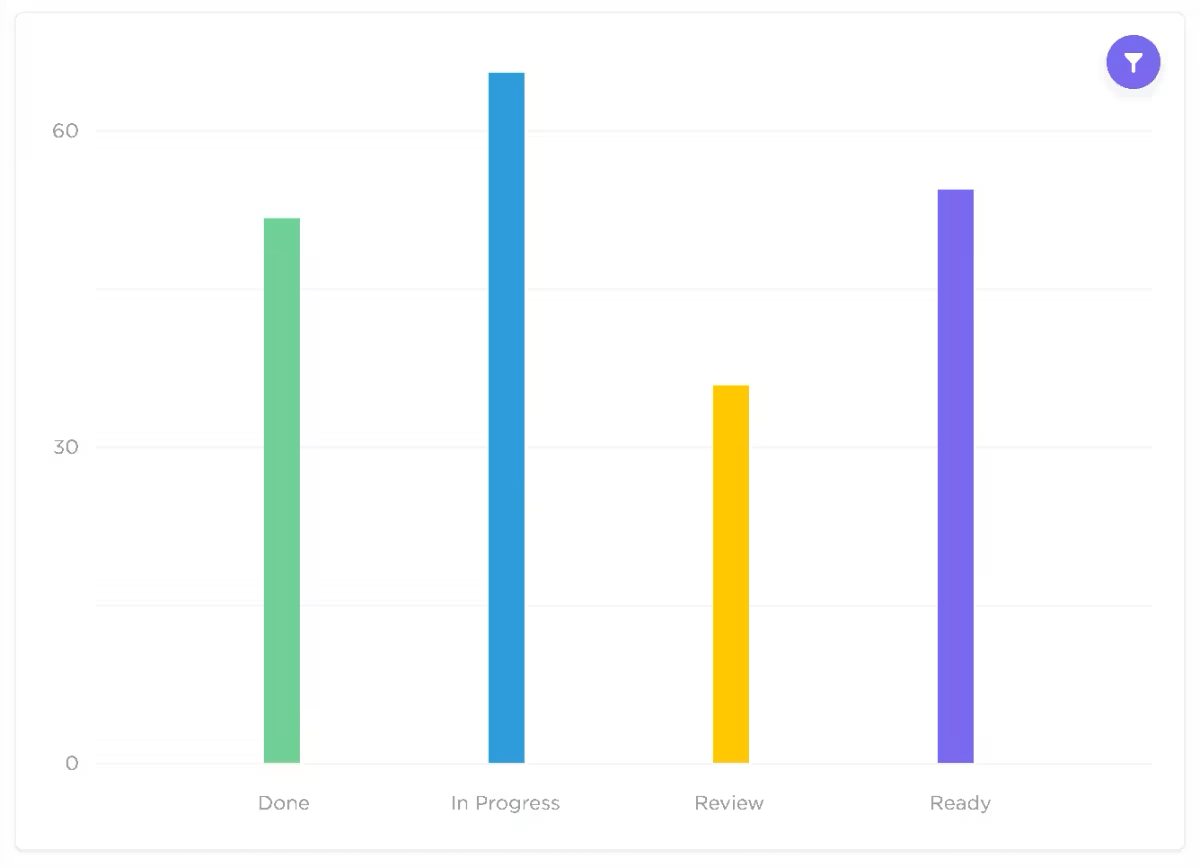
For starters, you can use the rich and interactive dashboards on ClickUp to visualize KPIs and other performance parameters in real time and review the effectiveness of marketing campaigns you launched with the mentor’s advice.
Such data-driven visibility helps you gauge the effectiveness of the mentorship program.
Plus, you can leverage templates designed to track career paths, like the ClickUp Career Path Template, to document your goals, action steps, and achievements over time.
This template allows you to map your career aspirations against organizational requirements. Such a value alignment lays the groundwork for a mutually beneficial career development roadmap that ensures professional and business success.
Open up to constructive feedback
Embrace constructive feedback for growth and improvement in your marketing skills and career trajectory. Staying open to the mentor’s advice and guidance helps cultivate a growth mindset that welcomes every opportunity to learn, refine, and grow your skills.
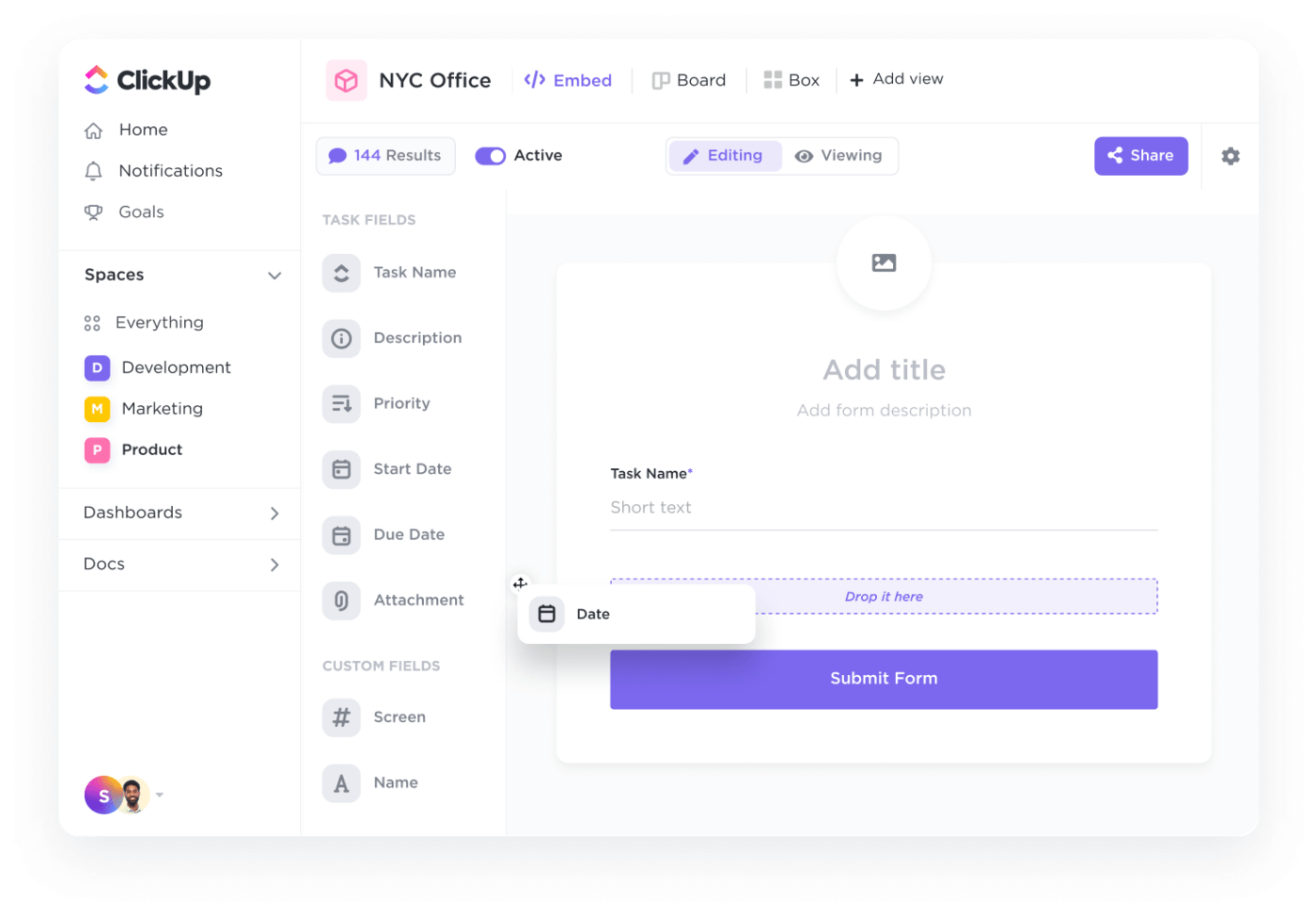
We’ve already seen how comments and mentions on ClickUp Chat can share instantaneous feedback and real-time discussions. At the same time, you may use ClickUp to create custom forms and surveys to collect feedback from your mentors.
Stay proactive
Stay proactive and engaged throughout the mentorship journey to take ownership of the mentoring experience. Actively seek out opportunities to grow, learn, and apply the insights acquired from your mentors.
Take initiatives like networking with other marketing professionals, pursuing additional learning resources, or enrolling in skill-building activities to complement mentorship and accelerate your professional development.
Pay it forward
As you progress in your marketing career and benefit from the mentorship program, your mentor may pass you the baton. This means that you now get the opportunity to mentor others. Share your knowledge, experiences, and insights with aspiring marketers or colleagues who can benefit from your expert advice and guidance.
In giving back to the community and supporting others in their career journey, you contribute to the collective growth of the marketing sector. At the same time, it can be your way to honor the legacy of mentorship that molded your success.
Ready to Take Over the Marketing World?
Finding a mentor starts with self-reflection and ends with community building.
Naturally, it is long and tedious but holds immense value to those serious about forging a successful career in marketing. Hopefully, the guide shared above helps you navigate the complexities of finding a marketing mentor who enriches your career.
For the rest, ClickUp can be an indispensable tool for facilitating marketing mentorship. From setting and tracking goals to collaborating on projects together, ClickUp can help you extract the most from your mentor-mentee relationship and your marketing career.




